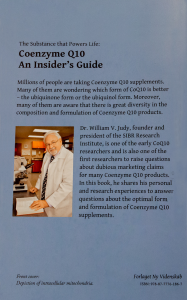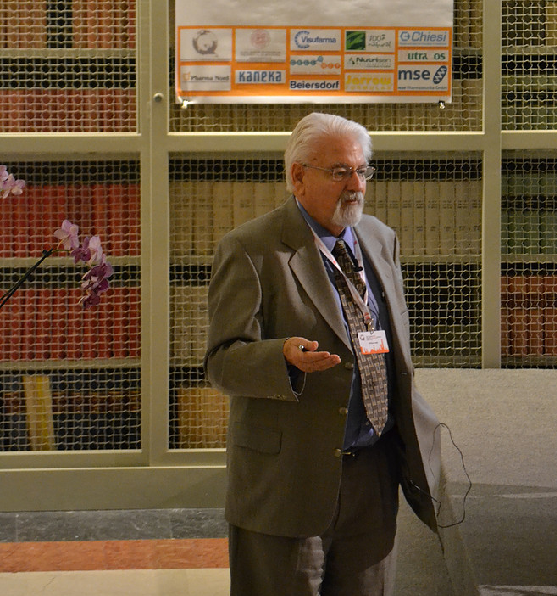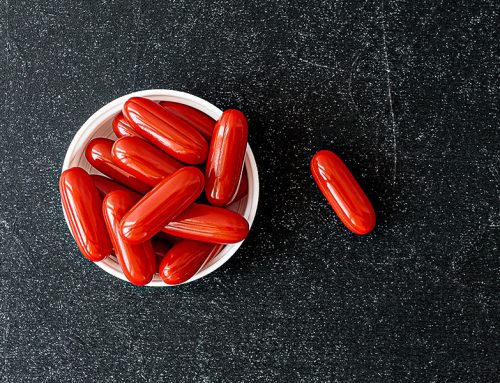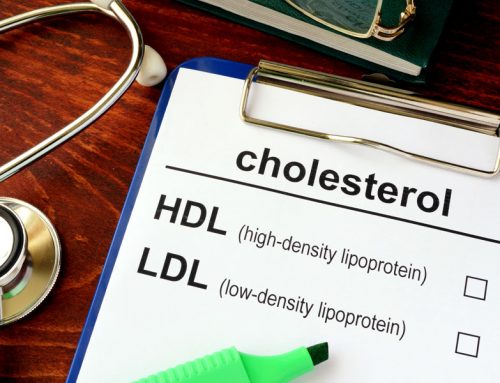Here, below, is what I have learned about Coenzyme Q10 over the years. CoQ10 is a naturally occurring redox compound that is essential for life in all humans. Dr. Karl Folkers called it “an essential bio-nutrient.”
- Coenzyme Q10 in its ubiquinone form, its oxidized state, plays an essential role in the production of ATP energy. It is needed in optimal quantities for cellular bio-energetics in heart muscle and skeletal muscle tissue.
- In its ubiquinol form, its reduced state, Coenzyme Q10 functions as a lipophilic antioxidant, scavenging harmful free radicals and providing protection against oxidative damage.
- CoQ10 supplementation has been shown to improve endothelial function [Belardinelli 2008]. The endothelial cells line the inside of the heart and the blood vessels. They are the cells that release substances that regulate the contraction and relaxation of the blood vessels, and they release enzymes that regulate blood clotting and platelet adhesion. They are very important for good heart health.
- In clinical trials, CoQ10 supplementation has been associated with anti-inflammatory effects. A meta-analysis of 17 clinical trials has shown that CoQ10 status is associated significantly with reduced levels of the inflammatory mediators C-reactive protein, interleukin-6, and tumor necrosis factor-α [Fan 2017].

In addition to doing clinical research into the efficacy of Coenzyme Q10 supplementation for some 40 years, early on in my career, I developed and refined a method of bio-electrical impedance measurement. I was able to use this non-invasive method to evaluate heart function in Black Lung Disease patients, in participants in the NASA Apollo program, and in open heart surgery patients in recovery. My message: use Coenzyme Q10 to ward off heart problems.
Blood and Tissue Deficiencies of Coenzyme Q10
- Blood and tissue CoQ10 deficiency can occur because of ageing and because of the effect of medications such as statins.
- Blood and tissue CoQ10 deficiency have been associated with statin-associated muscle symptoms (muscle aches and pains, severe cramps, muscle weakness) and with some of the symptoms of patients with heart failure and chronic fatigue syndrome (tiredness, fatigue, lack of energy).
- Evidence from a 2016 meta-analysis supports the use of supplemental Coenzyme Q10 in patients with statin-associated muscle symptoms [Qu 2016].
- The randomized controlled trial, the Q-Symbio Study, provides evidence for an adjunctive role for Coenzyme Q10 in the treatment of patients with chronic heart failure [Mortensen 2014].
- A 2013 meta-analysis has shown that supplementation with Coenzyme Q10 resulted in significantly improved ejection fraction and improved NYHA functional class [Fotino 2013].
CoQ10 Supplementation of Patients with Statin-Associated Muscle Symptoms
Writing in February, 2021, in a special issue of one of the leading cardiology journals: Journal of the American College of Cardiology, Texas cardiologists Albert E. Raizner and Miguel A. Quiñones, conclude that it seems “reasonable and justifiable” for cardiologists to use Coenzyme Q10 supplements with patients diagnosed with statin-associated muscle symptoms [Raizner & Quiñones 2021].
Moreover, Raizner & Quiñones say that some clinical trial evidence now supports the adjunctive use of Coenzyme Q10 in patients with heart failure, especially patients with less severe heart failure, e.g. patients with ejection fraction above 30%.
Explanation: The human body produces cholesterol and Coenzyme Q10 in the same biological pathway. The use of statin medications to inhibit the bio-synthesis of cholesterol necessarily involves an inhibition of the bio-synthesis of Coenzyme Q10, typically in patients whose heart muscle cells need Coenzyme Q10 for ATP energy production [Okuyama 2015].
Absorption of CoQ10 Supplements Depends Upon the Formulation
Commonly, CoQ10 supplements come in 100-mg capsules. The capsules should be taken together with a meal containing some fat. Absorption of Coenzyme Q10 from supplements improves if the individual capsules are taken in divided dosages. Two times 100-mg a day at different mealtimes will give greater absorption than one times 200-mg at one meal [Singh 2005].
In a double-blind cross-over study of the bioavailability of various CoQ10 formulations, researchers found a superior absorption of a formulation of ubiquinone compared with ubiquinol [Lopez-Lluch 2019].

In this book, I describe the SIBR Research Institute lab studies and large dog studies that have led me to conclude that commercially available ubiquinol products are, for the most part, not stable. They tend to oxidize to the ubiquinone state. And, in any case, Coenzyme Q10 is absorbed in the ubiquinone form regardless of whether it is taken as ubiquinone or ubiquinol supplement.
In my book, I explain how the absorption of Coenzyme Q10 depends upon the dissociation of the raw material crystals to single molecules. At body temperature, the individual CoQ10 molecules tend to clump together into indigestible crystals. These crystals cannot penetrate the membranes of the intestinal absorption cells, cannot diffuse into the lymph circulation, and cannot be transported to the blood wall [Judy 2018].
Dosage of CoQ10 Supplements
In heart disease clinical trials, researchers have used daily doses of 100 mg to 400 mg.
In the Q-Symbio Study of the effect of CoQ10 adjunctive treatment on heart failure patients, researchers used 3 times 100-mg daily for two years [Mortensen 2014]. Compared to the placebo treatment, the adjuvant CoQ10 treatment was associated with the following significant outcomes:
- Major adverse cardiovascular events were reduced by 42% in the CoQ10 adjuvant treatment group.
- Cardiovascular mortality was reduced by 44% in the CoQ10 adjuvant treatment group.
- All-cause mortality was reduced by 44% in the CoQ10 adjuvant treatment group.
- The incidence of hospital stays for heart failure was reduced.
- NYHA functional class was improved.
In the KiSel-10 Study of the effect of combined Coenzyme Q10 and selenium on senior citizens, researchers used 2 times 100-mg of Coenzyme Q10 daily for four years [Alehagen 2013]. Compared to placebo, the combination Coenzyme Q10 and selenium was associated with significant heart health benefits:
- Cardiovascular mortality was reduced by 53% in the CoQ10 + selenium active treatment group.
- Heart function as seen on echocardiography was improved in the CoQ10 + selenium group.
- Blood levels of a protein bio-marker for the risk of heart failure were reduced.
Safety of CoQ10 Supplementation
Raizner and Quinones [2021] write that the safety of dosages of supplemental Coenzyme Q10 even higher than 300 mg per day over long periods is well documented. Adverse reactions are rare and mild; there may be occasional gastrointestinal upset.
In neurodegenerative disease clinical trials – Huntington’s disease, Parkinson’s disease, and amyotrophic lateral sclerosis – daily doses of 600 mg to 3,000 mg have been used safely [Raizner & Quinones 2021].
A risk assessment for Coenzyme Q10 based on clinical trial data indicates that the observed safety level for Coenzyme Q10 is 1200 mg per day [Hidaka 2008].
Coenzyme Q10-Drug Interactions
Clinical trials have provided evidence for the following observations [Raizner & Quinones 2021]:
- Supplemental Coenzyme Q10 improve glycemic control in diabetic patients [Eriksson 1999; Henriksen 1999], possibly making dosage reduction of hypoglycemic agents necessary.
- Coenzyme Q10 has the potential to lower blood pressure [Rosenfeldt 2007]; accordingly, an adjustment in the dosage of anti-hypertensive medications may be needed.
- A randomized, placebo-controlled trial of the effect of CoQ10 supplementation on the efficacy of the anti-coagulant warfarin did not show any harmful effect [Engelsen 2003].
CoQ10 Supplementation and Heart Disease
Raizner & Quinones emphasize the importance of the Q-Symbio Study, a randomized controlled study enrolling 420 chronic heart failure patients. The Q-Symbio Study outcomes reaffirm the results of earlier clinical trials of Coenzyme Q10 supplementation of heart failure patients:
- Langsjoen et al. [1985]: Improved activity tolerance, improved clinical observations, improved stroke volume measured by impedance cardiography, and improved ejection fraction.
- Judy et al. [1986]: Improved cardiac index, improved stroke index, and improved ejection fraction.
- Morisco et al. [1993]: Reduced rate of hospitalization, reduced incidence of pulmonary edema, reduced incidence of cardiac asthma (breathless, wheezing), and reduced incidence of arrhythmia.
- Hofman-Bang et al. [1995]: Improved ejection fraction 1) at rest, 2) during a slight volume load, and 3) during a sub-maximal supine exercise plus improved maximal exercise capacity.
- Munkholm et al. [1999]: Improved stroke index at rest and at work, decreased pulmonary artery pressure at rest and at work, decreased pulmonary capillary wedge pressure at rest and at 1-minute work.
- Keogh et al. [2003]: Improved scores on the Specific Activities Scale, improved 6-min walk-test distance, improved Naughton exercise time, and improved NYHA functional class by 1/2 class.
- Belardinelli et al. [2006]: Improved endothelium function, improved left ventricular contractility, improved peak VO2, and reduced systolic wall thickening.
Conclusion: Coenzyme Q10 Supplements for Prevention and Treatment of Heart Disease
- The efficacy of CoQ10 treatment of heart disease patients is well-documented.
- Some Coenzyme Q10 supplements are safe, effective, and affordable. (I do not believe that all CoQ10 products are safe, effective, and inexpensive, not at all.)
- Not all CoQ10 supplements are equally well absorbed. It is a waste of money to buy a badly formulated CoQ10 supplement that gives little absorption. Buyer beware!
- CoQ10 supplements in the ubiquinone form have a long history of use in clinical trials. The ubiquinone CoQ10 supplement will significantly increase blood levels of the antioxidant form, ubiquinol. It is not necessary to take a ubiquinol supplement to get enough ubiquinol. Please see my book on this topic.
Read our key article about CoQ10 and cardiovascular health in elderly people
Read our key article on CoQ10 as adjuvant therapy for heart failure
Sources
Belardinelli R, Tiano L, Littarru GP. Oxidative stress, endothelial function and coenzyme Q10. Biofactors. 2008;32(1-4):129-33.
Engelsen J, Nielsen JD, Hansen KF. Effect of Coenzyme Q10 and Ginkgo biloba on warfarin dosage in patients on long-term warfarin treatment. A randomized, double-blind, placebo-controlled cross-over trial. Ugeskr Laeger. 2003;165:1868–71.
Eriksson JG, Forsén TJ, Mortensen SA, Rohde M. The effect of coenzyme Q10 administration on metabolic control in patients with type 2 diabetes mellitus. Biofactors. 1999;9(2-4):315-8.
Fan L, Feng Y, Chen GC, Qin LQ, Fu CL, Chen LH. Effects of coenzyme Q10 supplementation on inflammatory markers: A systematic review and meta-analysis of randomized controlled trials. Pharmacol Res. 2017 May;119:128-136.
Fontino AD, Thompson-Paul AM, Bazzano LA. Effect of coenzyme Q₁₀ supplementation on heart failure: a meta-analysis. Am J Clin Nutr 2013;97: 268–75.
Golomb BA, Allison M, Koperski, et al. Coenzyme Q10 benefits symptoms in Gulf War veterans: results of a randomized double-blind study. Neural Comput 2014;26:2594–651.
Henriksen JE, Andersen CB, Hother-Nielsen O, Vaag A, Mortensen SA, Beck-Nielsen H. Impact of ubiquinone (coenzyme Q10) treatment on glycaemic control, insulin requirement and well-being in patients with Type 1 diabetes mellitus. Diabet Med. 1999 Apr;16(4):312-8.
Hidaka T, Fujii K, Funahashi I, Fukutomi N, Hosoe K. Safety assessment of coenzyme Q10 (CoQ10). Biofactors. 2008;32(1-4):199-208.
Hofman-Bang C, Rehnqvist N, Swedberg K, Wiklund I, Aström H. Coenzyme Q10 as an adjunctive in the treatment of chronic congestive heart failure. The Q10 Study Group. J Card Fail. 1995 Mar;1(2):101-7.
Judy W, Hall J, Toth P, et al. Double blind-double crossover study of coenzyme Q10 in heart failure. Biomed Clin Aspects Coenzyme Q. 1986;5:315–23.
Judy WV. Coenzyme Q10: An Insider’s Guide. Ny Videnskab, 2018. ISBN: 978-87-7776-186-7.
Keogh A, Fenton S, Leslie C, Aboyoun C, Macdonald P, Zhao YC, Bailey M, Rosenfeldt F. Randomised double-blind, placebo-controlled trial of coenzyme Q, therapy in class II and III systolic heart failure. Heart Lung Circ. 2003;12(3):135-41.
Langsjoen PH, Vadhanavikit S, Folkers K. Effective treatment with coenzyme Q10 of patients with chronic myocardial disease. Drugs ExpClin Res. 1985;11:577–9.
Lopez-Lluch G, del Ponzo-Cruz J, Sanchez-Cuesta A, et al. Bioavailability of coenzyme Q10 supplements depends on carrier lipids and solubilization. Nutrition. 2019;57:133–40.
Morisco C, Timarco B, Condorelli M. Effect of coenzyme Q10 therapy in patients with congestive heart failure: a long-term multicenter randomized trial. Clin Investig 1993;71:S134–6.
Mortensen SA, Rosenfeldt F, Kumar A, et al. The effect of coenzyme Q10 on morbidity and mortality in chronic heart failure: results from Q-SYMBIO: a randomized double-blind trial. J Am Coll Cardiol HF 2014; 2:641–9.
Munkholm, H., Hansen, H. H., & Rasmussen, K. (1999). Coenzyme Q10 treatment in serious heart failure. Biofactors (Oxford, England), 9(2-4), 285-289.
Okuyama H, Langsjoen PH, Hamazaki T, Ogushi Y, Hama R, Kobayashi T, Uchino H. Statins stimulate atherosclerosis and heart failure: pharmacological mechanisms. Expert Rev Clin Pharmacol. 2015 Mar;8(2):189-99.
Qu H, Guo M, Chai H, et al. Effects of Coenzyme Q10 on statin-induced myopathy: an updated meta-analysis of randomized clinical trials. J Am Heart Assoc 2018;2:e009835.
Raizner AE, Quiñones MA. Coenzyme Q10 for Patients with Cardiovascular Disease: JACC Focus Seminar. J Am Coll Cardiol. 2021 Feb 9;77(5):609-619.
Rosenfeldt FL, Haas SL, Krum H, et al. Coenzyme Q10 in the treatment of hypertension: a meta-analysis of the clinical trials. J Human Hypertens 2007;21:297–306.
Singh RB, Niaz MA, Kumar A, Sindberg CD, Moesgaard S, Littarru GP. Effect on absorption and oxidative stress of different oral Coenzyme Q10 dosages and intake strategy in healthy men. Biofactors. 2005;25(1-4):219-24.
The information presented in this article is not intended as medical advice and should not be used as medical advice.
3 July 2021









Leave A Comment